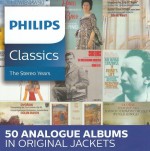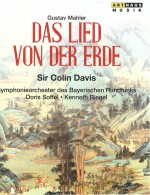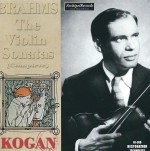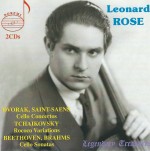Old Wine in New Bottles | Fine Recordings Re-Released - April 2016
 A new box of Philips Classics restores to the catalog a wealth of analogue recordings that were, not so long ago, in wide demand by music lovers around the world: Philips Classics The Stereo Years – 50 Analogue Albums in Original Jackets (Decca 4788977, 50 CDs). After WWII Philips entered the blossoming long-playing record business by issuing American Columbia recordings in Europe under their own Philips mini-groove imprint. Columbia, inventors of the long-playing record, owned the LP logo and for many years no other manufacturer could call their product an LP. Very soon LP became generic however and that was that.
A new box of Philips Classics restores to the catalog a wealth of analogue recordings that were, not so long ago, in wide demand by music lovers around the world: Philips Classics The Stereo Years – 50 Analogue Albums in Original Jackets (Decca 4788977, 50 CDs). After WWII Philips entered the blossoming long-playing record business by issuing American Columbia recordings in Europe under their own Philips mini-groove imprint. Columbia, inventors of the long-playing record, owned the LP logo and for many years no other manufacturer could call their product an LP. Very soon LP became generic however and that was that.
Philips productions were of the highest quality, both sonically and in their immaculate pressings. In fact, when their discs were eventually pressed in North America, knowledgeable music lovers sought out the better sounding Dutch pressings in their gatefold covers even though they were marginally more expensive. It may be of some interest to audiophiles that after Ray Dolby developed his noise reduction system that enabled producers and engineers to make more accurate and wider range recordings, Dolby became the universal noise reduction system (and still is). Philips, though, preferred to tilt the high frequencies up in the recording and reverse the process for playback. Simple…tape hiss gone. There’s more to it than that, but that’s how Philips touted it at the time. In 1979 when Polygram bought Decca they owned DG, Philips and Decca, and although each company shared their technologies with the others, each retained its own recognizable sound due to the preferred choice of microphones, set-up and certainly recognizable artistic preferences. Philips, in close cooperation with Sony, devised and perfected digital encoding and in 1979 began recording digitally. The recorded performances in this box are from the analogue era, 50 recordings in replicas of their LP original jackets, often with bonus tracks.
Most music lovers of a certain age – make that of any age – will be thrilled to the teeth to hear the musicians whose artistry lives on in these recordings. Dutch soprano Elly Ameling sings Schumann, Frauenliebe und -leben and Liederkreis, and ten Schubert lieder with Dalton Baldwin and Jörg Demus (1973, 1979). Mezzo Janet Baker sings Handel and Gluck with Raymond Leppard (1972, 1975). Cristina Deutekom, the Dutch coloratura, sings Verdi, Bellini, J. Strauss, etc. (1969, 1971). Dramatic soprano, Jessye Norman sings Ravel’s Shéhérazade and Berlioz’s Les Nuits d’été (1979). Gérard Souzay, the French baritone, sings Handel, Rameau, Lully and Ravel (1963, 1968). José Carreras sings 16 arias from Verdi to Rossini (1976, 1980); and there are others.
Pianist Claudio Arrau, once a towering figure, plays Liszt’s Twelve Transcendental Etudes (1976) and the Concert Paraphrase on Aida (1971), also Beethoven’s Third and Fourth Piano Concertos with the Concertgebouw Orchestra and Bernard Haitink (1964). Alfred Brendel plays Schubert’s Sonata D960, The Wanderer Fantasy and Three Klavierstücke D946 (1971, 1974), Liszt’s two concertos and Totentanz (LPO Haitink, 1972), three Mozart concertos, K450, K467 and K488 (1971, 1981) and of course, the Sviatoslav Richter Sofia recital of February 1958. And lots more.
How about symphonies? Brahms’ First and Fourth (van Beinum), Saint-Saëns’ Third (Daniel Chorzempa organ, Edo de Waart). I must mention that this recording was made with the Rotterdam Philharmonic in the organ’s home, De Doelen, Rotterdam. Overwhelming sound. Simply fabulous! Well deserving of mention are the Concertgebouw Orchestra recordings: The Sibelius Second conducted by George Szell, the Dvorak Seventh under Colin Davis, Heldenleben (Haitink), Bruckner Ninth (Haitink), Bruckner Fifth (Eugene Jochum), Schubert Ninth (Haitink) and many other so well-remembered classic recordings.
In this collection there is not a single recording or performance of less than exemplary quality but check them all out for yourself at deccaclassics.com/us/cat/4788977.
 Arthaus Musik has issued a Blu-Ray video of a really great live performance of Mahler’s Das Lied von der Erde with Sir Colin Davis, the Bavarian Radio Symphony and soloists Doris Soffel and Kenneth Riegel (ArtHaus Musik 109113). It is fortunate for us that this 1988 event from Munich was flawlessly documented in both audio and video. Davis is not usually remembered for his Mahler, although he has directed impressive productions throughout his career.
Arthaus Musik has issued a Blu-Ray video of a really great live performance of Mahler’s Das Lied von der Erde with Sir Colin Davis, the Bavarian Radio Symphony and soloists Doris Soffel and Kenneth Riegel (ArtHaus Musik 109113). It is fortunate for us that this 1988 event from Munich was flawlessly documented in both audio and video. Davis is not usually remembered for his Mahler, although he has directed impressive productions throughout his career.
Davis was such a natural, intuitive Mahlerian in this performance that it’s a pity that he did not set down a complete cycle of this calibre. Of course he has the redoubtable Bavarian Radio Symphony Orchestra, with whom he recorded the First, Fourth and Eighth, who are surely at home in this work. The best news is the choice of soloists because both Riegel and Soffel have not been able to elsewhere demonstrate their mastery of this demanding work. From the first song, Riegel creates a bright, constantly dramatic tone, cutting through the orchestral welter. Here we can see just how fluently he projects every meaning of the text with intense, vehement authority.
Soffel is captured in a role for which she was clearly born. In this production her alto voice is perfect for the role. She comes into her own after the orchestral interlude in Der Abschied where she projects a sense of loneliness and emptiness with the tone of her voice wherein she keeps any warmth under strict control, to crushing effect.
Mahler, deeply superstitious, salted away the finished score and never heard it performed.
 Leonid Kogan (1924-1982) was born in Kiev and came to be one of the foremost violinists of the 20th century. From about 1955 on, he was considered to be among the supreme artists of his era. One only needs to hear any of his recordings to agree. Archipel has returned to the catalog the three Brahms Violin Sonatas with his accompanist Andrei Mytnik (ARPCD 03550). The first two are studio recordings and the third live from Moscow in 1956. As a bonus there are the Brahms Hungarian Dances 1, 2, 4 and 17. From the first few bars of the First Sonata, through to an inspired finale we hear totally natural Brahms played with commanding mastery.
Leonid Kogan (1924-1982) was born in Kiev and came to be one of the foremost violinists of the 20th century. From about 1955 on, he was considered to be among the supreme artists of his era. One only needs to hear any of his recordings to agree. Archipel has returned to the catalog the three Brahms Violin Sonatas with his accompanist Andrei Mytnik (ARPCD 03550). The first two are studio recordings and the third live from Moscow in 1956. As a bonus there are the Brahms Hungarian Dances 1, 2, 4 and 17. From the first few bars of the First Sonata, through to an inspired finale we hear totally natural Brahms played with commanding mastery.
 The late Leonard Rose was an American cellist who was best known during the 1950s and the 1960s through his Columbia recordings of concertos with the New York Philharmonic and the Philadelphia Orchestra and later as a member of the very special Istomin-Stern-Rose Trio. Well-respected are his early 1950s recordings with the New York Philharmonic, of which he was principal cellist, of Bloch’s Schelomo with Dimitri Mitropoulos and Tchaikovsky’s Rococo Variations under George Szell. Although many or most of his Columbia recordings remain in print as reissues, collectors are always on the lookout for live performances from around the world residing in radio archives. There are three cello concertos: Dvořák with Charles Dutoit and the ORTF Orchestra (1967); Saint-Saëns No.1 and Tchaikovsky’s Rococo Variations with Louis de Froment from Radio Luxembourg (1961); and Beethoven’s Fifth Cello Sonata with Eugene Istomin (Stratford, 1969). From WQXR in NYC, playing with pianist Nadia Reisenberg, Rose plays Beethoven’s Third Cello Sonata and Brahms First Cello Sonata (1973). These performances issued by Doremi (DHR-8038/9, 2CDs) are not intended to replace his commercial recordings but to confirm and enjoy his unmistakable, now legendary powerful sonorities and musicianship.
The late Leonard Rose was an American cellist who was best known during the 1950s and the 1960s through his Columbia recordings of concertos with the New York Philharmonic and the Philadelphia Orchestra and later as a member of the very special Istomin-Stern-Rose Trio. Well-respected are his early 1950s recordings with the New York Philharmonic, of which he was principal cellist, of Bloch’s Schelomo with Dimitri Mitropoulos and Tchaikovsky’s Rococo Variations under George Szell. Although many or most of his Columbia recordings remain in print as reissues, collectors are always on the lookout for live performances from around the world residing in radio archives. There are three cello concertos: Dvořák with Charles Dutoit and the ORTF Orchestra (1967); Saint-Saëns No.1 and Tchaikovsky’s Rococo Variations with Louis de Froment from Radio Luxembourg (1961); and Beethoven’s Fifth Cello Sonata with Eugene Istomin (Stratford, 1969). From WQXR in NYC, playing with pianist Nadia Reisenberg, Rose plays Beethoven’s Third Cello Sonata and Brahms First Cello Sonata (1973). These performances issued by Doremi (DHR-8038/9, 2CDs) are not intended to replace his commercial recordings but to confirm and enjoy his unmistakable, now legendary powerful sonorities and musicianship.


